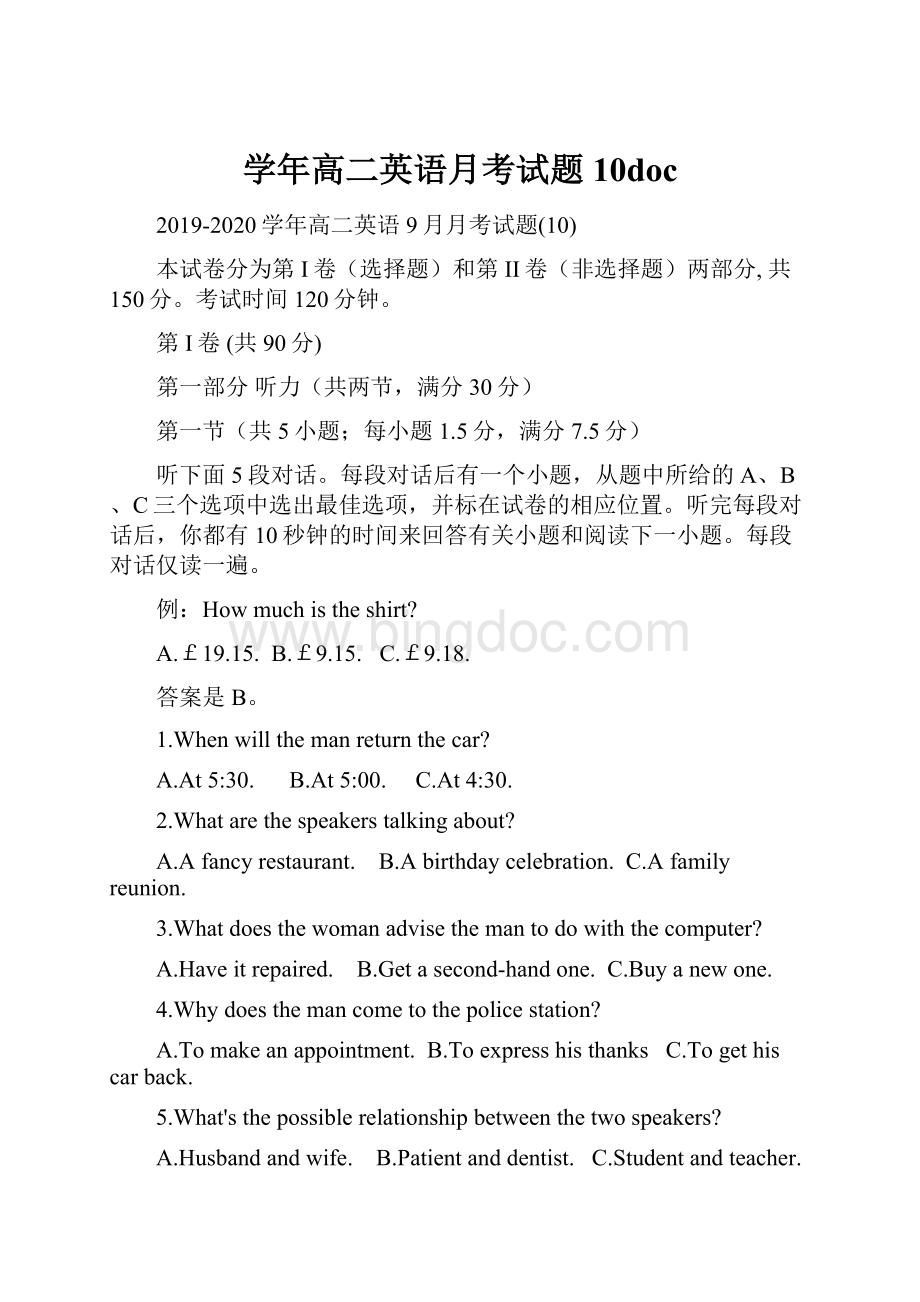学年高二英语月考试题10doc.docx
《学年高二英语月考试题10doc.docx》由会员分享,可在线阅读,更多相关《学年高二英语月考试题10doc.docx(18页珍藏版)》请在冰点文库上搜索。

学年高二英语月考试题10doc
2019-2020学年高二英语9月月考试题(10)
本试卷分为第I卷(选择题)和第II卷(非选择题)两部分,共150分。
考试时间120分钟。
第I卷(共90分)
第一部分听力(共两节,满分30分)
第一节(共5小题;每小题1.5分,满分7.5分)
听下面5段对话。
每段对话后有一个小题,从题中所给的A、B、C三个选项中选出最佳选项,并标在试卷的相应位置。
听完每段对话后,你都有10秒钟的时间来回答有关小题和阅读下一小题。
每段对话仅读一遍。
例:
Howmuchistheshirt?
A.£19.15.B.£9.15.C.£9.18.
答案是B。
1.Whenwillthemanreturnthecar?
A.At5:
30.B.At5:
00.C.At4:
30.
2.Whatarethespeakerstalkingabout?
A.Afancyrestaurant.B.Abirthdaycelebration.C.Afamilyreunion.
3.Whatdoesthewomanadvisethemantodowiththecomputer?
A.Haveitrepaired.B.Getasecond-handone.C.Buyanewone.
4.Whydoesthemancometothepolicestation?
A.Tomakeanappointment.B.ToexpresshisthanksC.Togethiscarback.
5.What'sthepossiblerelationshipbetweenthetwospeakers?
A.Husbandandwife.B.Patientanddentist.C.Studentandteacher.
第二节(共15小题;每小题1.5分,满分22.5分)
听下面5段对话或对白,每段对话或独白后有几个小题,从题中所给的A、B、C三个选项中选出最佳选项,并标在试卷的相应位置,听每段对话或独白前,你将有时间阅读各个小题。
每小题5秒钟;听完后,各小题给出5秒钟的作答时间。
每段对话或独白读两遍。
听第6段材料,回答第6至7题。
6.Whatcoursewillthemantake?
A.Computerprogramming.B.Dataprogressing.C.Hardwaremanaging.
7.Whichscheduleissuitablefortheman?
A.OnMondayevenings.B.OnTuesdayevenings.C.OnThursdayevenings
听第7段材料,回答第8至9题。
8.WhatdoSwedishpeoplecomplainaboutwhentheyvisitEnglandinwinter?
A.Thebadweather.B.Thecoldhouses.C.Thelongnight.
9.Whichseasondoesthemanprobablylikebest?
.
A.Winter.B.Spring.C.Summer.
听第8段材料,回答第10至12题。
10.Howdidthewomangettoknowaboutthejob?
A.Bylisteningtothemorningnews.
B.Byreadinganewspaperad.
C.Bycallinganemploymentservice.
11.Whywasthewomaninterestedinthejob?
A.ToimproveherFrenchandItalian.
B.Touseherpreciousexperiences.
C.Toworkclosetoherfamily.
12.Whatwasthewomansupposedtodonext?
A.Sendawrittenapplicationassoonaspossible.
B.Prepareforaninterviewinacoupleofdays.
C.Readtheadvertisementagainformoredetails.
听第9段材料,回答第13至16题。
13.Whatkindofbackpackdoesthemanlose?
A.Aleatherone.B.Asportsone.C.Asolarone.
14.Whereisthepatternofthebackpack?
A.Onthefront.B.Ontheback.C.Onthetop.
15.Whichgiftisforhiswife?
A.Perfume.B.Sneakers.C.Gloves.
16.Whatdoesdoesthemanthinkofthewoman?
A.Cooperative.B.Responsible.C.Humorous.
听第10段独白,回答第17至20题。
17.WhereistheMocoa?
A.InthesouthwestofColombia.B.InthesouthwestofAmerica.C.InthenorthwestofColombia.
18.Howmanypeoplewerekilled?
A.Over1,000.B.Over100.C.Over200.
19.Whyisitdifficulttogettothetrappedpeople?
A.Becausemanypeopleweresleeping.
B.Becausetheroadconditionswerepoor.
C.Becausetherainwasmuchtooheavy.
20.Whatisthepassagemainlyabout?
A.AdisasterinMocoa.B.ThebadweatherinAmerica.C.Ahelpfulgovernment.
第二部分阅读理解(共20小题;每小题2分,满分40分)
第一节(共15小题;每小题2分,满分30分)
阅读下列短文,从每题所给的四个选项(A、B、C和D)中,选出最佳选项,并在答题卡上将该项涂黑。
A
It'srarethatyouseethewords"shyness"and"leader"inthesamesentence.Afterall,thecommonviewpointisthatthoseoutgoingandsociableguysmakegreatpublicspeakersandexcellentnetworkersandthatthoseshypeoplearenot.AsurveyconductedbyUSATodayreferredto65percentofexecutiveswhobelievedshynesstobeabarriertoleadership.Interestingly,thesamearticlestressesthatroughly40percentofleadersactuallyarequiteshy—they'rejustbetteratadaptingthemselvestosituationaldemands.BillGates,WarrenBuffetandCharlesSchwabarejustafew"innies".
Unliketheiroutgoingcounterpartswhoaremoresensitivetorewardsandrisk-taking,shypeopletakeacautiousapproachtochance.Ratherthantheflashychit-chatthatdefinessocialgathering,shypeoplelistenattentivelytowhatotherssayandabsorbitbeforetheyspeak.They'renotthinkingaboutwhattosaywhiletheotherpersonisstilltalking,butratherlisteningsotheycanlearnwhattosay.Alongthesamelines,shypeopleshareacommonloveoflearning.Theyareintrinsically(内在地)motivatedandthereforeseekcontentregardlessofachievinganoutsidestandard.
Beingshycanalsobringotherbenefits.Rememberbeinginschoolandhearingthesamekidscontribute,untilshylittleJohnny,whoalmostneversaidaword,cutin?
Thenwhathappened?
EveryoneturnedaroundtolookwithgreatrespectatlittleJohnnyactuallytalking.Thisishowshypeoplemadegooduseoftheirpowerofpresence:
they"own"themomentbyspeakingcalmlyandpurposefully,whichtranslatetoapositiveimage.
Shynessisoftenrelatedtomodesty.Nottosaythatlimelight-seekersaren'tmodest,butshypeopletendtohaveanaccuratesenseoftheirabilitiesandachievements.Asaresult,theyareabletoacknowledgemistakes,imperfections,knowledgegapsandlimitations.
Sinceshypeoplehavealowersensitivitytooutsiderewardsthanoutgoingones,they'remorecomfortableworkingwithlittleinformationandstickingtotheirinnerdesires.Shypeoplearealsomorelikelytoinsistonfindingsolutionsthataren'tprimarilyapparent.Don'tbelieveme?
Maybeyou'llbelieveAlbertEinstein,whooncesaid,"It'snotthatI'msosmart,it'sthatIstaywithproblemslonger."Obviously,findingcertaintywhereuncertaintyistypicallypopularisahugeplusforanysuccessfulperson.
Themyththatshypeoplearelesseffectiveleadersthantheiroutgoingfellowsisjustamisunderstanding.Makewiseuseofyourpersonalitystrengthstoleadyourbusinessnomatterwhatsideoftherangeyoufallon.
21.WecanlearnfromParagraph2that___________.
A.shypeoplearesensitivetorewards
B.shypeoplecaremoreaboutcontent
C.outgoingpeoplearemorecarefulaboutchances
D.outgoingpeopleconsiderwhattolearnwhilelistening
22.TheexampleofJohnnyshows____________.
A.shypeoplearelikelytobemodest
B.hardworkingstudentsspeaklittleinpublic
C.somestudentskeepsilentonpurposeatschool
D.shypeoplemayhaveanadvantageindiscussion
23.WecanlearnfromtheunderlinedsentenceinParagraph5that____________.
A.shynessresultsinsuccessB.shynesscontributestopopularity
C.outsiderewardleadstoinsistenceD.uncertaintycountsmorethancertainty
24.Theauthorsupportshisideasmainlyby____________.
A.givingdefinitionsandpresentingresearchresultsB.explainingproblemsandprovidingsolutions
C.quotingauthoritiesandmakingevaluationsD.makingcontrastsandgivingexamples
B
“Can’tholdacandleto”isapopularexpression.Whentherewasn’telectricity,someonewouldhaveaservantlighthiswaybyholdingacandle.Theexpressionmeantthatthepersonwhocannotholdacandletoyouisnotfiteventobeyourservant.Now,itmeansthepersonwhocannotcompareorcompete.
Anotherexpressionis“holdyourtongue.”Itmeanstobestillandnottalk.“Holdyourtongue”isnotsomethingyouwouldtellafriend.Butaparentorteachermightusetheexpressiontoquietanoisychild.
“Holdout”isanexpressiononehearsofteninsportsreportsandlabornews.Itmeanstorefusetoplayorwork.Professionalfootballandbaseballplayers“holdout”iftheirteamrefusestopaythemwhattheythinktheyareworth.
Theexpression“holdup”hasseveraldifferentmeanings.Oneisarobbery.Amanwithagunmaysay,“Thisisaholdup.Givemeyourmoney.”Anothermeaningistodelay.Adriverwhowasheldupbyheavytrafficmightbelateforwork.Anothermeaningisforastorytobeconsideredtrueafteraninvestigation.Astorycanholdupifitisprovedtrue.
“Holdon”isanotherexpression,whichmeanswaitorstop.Asyouleaveforschool,yourbrothermaysay,“Holdon,youforgotyourbook.”Itisusedtoaskatelephonecallertowaitandnothanguphistelephone.
Ourfinalexpressionis“holdtheline.”Thatmeanstokeepaproblemorsituationfromgettingworse—toholdsteady.Forexample,thepresidentmaysayhewill“holdthelineontaxes.”Hemeanstherewillbenoincreaseintaxes.
25.Theexpression“can’tholdacandleto”canbeusedwhen____________.
A.somefootballersrefusetoplayagameB.someoneelseiswantedonthephone
C.someoneisnotqualifiedforapositionD.someonewasdelayedbyheavytraffic
26.Ifsometeachers“holdout”,theyprobably__________.
A.changetheirattitudeB.refusetowork
C.makeacompromiseD.showtheirdevotion
27.Whichofthefollowingsentencescanconveypositivemeanings?
A.IwaslateasIwasheldupbyaholdup.B.Holdon!
Youhavetopaythebill,sir.
C.Youcan’tevenholdacandletoMichael.D.Ipromisetoholdthelineonhouseprices.
C
Howcanwereducetherisk?
Therearefourgeneralapproachestodealingwithvolcanic(火山似的)dangers.Wecantrytokeepthedangerfromoccurring-oftenanimpossibletask.Wecantrytochangeitspathorreduceitsimpactonexistingdevelopment.Wecantakestepstoprotectfuturedevelopment.Wecanalsodoourbesttohavedisasterresponseplansinplacebeforetheyareneeded.
RemovingtheThreat
Clearly,thereisnowaytostopaneruption.Wecan,however,attempttoreducetheeruption’seffectsbystrengtheningstructures,forexample,buildingprotectiveworkssuchaswallstomakelava(熔岩)flowawayfromdevelopedareas.Sucheffortscanbeandhavebeensuccessful,butareoflimiteduseinalarge-scale(范围)eruption.
PlanningfortheFuture
Protectingfuturedevelopmentfromvolcanicdangersisasimpletask.Beforebuildinghouses,weshouldjudgetherisk.Iftheriskseemstoogreat,asaferlocationshouldbefound.Thistypeofplanningisveryeffective,butalltoooften,peoplearedrawntothelush(葱郁的),rollinglandofaquietvolcano.
DisasterPrepared